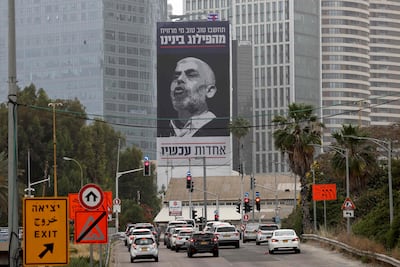One of the major paradoxes in the ongoing war in Gaza is that Israeli Prime Minister Benjamin Netanyahu and his arch-enemy, the head of Hamas in the territory, Yahya Sinwar, both have an interest in allowing the fighting to continue, as they fear the political reckoning that will come once the violence ends.
For Mr Netanyahu, the challenges are clear. His government, and the army and intelligence services under its authority, were poorly prepared for the Hamas operation of October 7, 2023, despite warning signs, and despite the insistence of military officials that the national rift over a controversial constitutional amendment sought by the Prime Minister was making Israel unsafe.
Since then, Mr Netanyahu’s priority has been to guarantee his political survival. That’s why he has bowed to the demands of extremist ministers in his cabinet, while resisting any long-lasting ceasefire agreement that might detract from securing what he regards as a complete victory in Gaza. Such a victory may be the only thing that saves him.

But what about Mr Sinwar? As time passes, it is becoming increasingly plausible to assume that what happened on October 7 could have been power play by the leader in Gaza, in collaboration with Mohammed Deif, the head of the Ezzeddine Al Qassam Brigades, Hamas’s military wing, to impose himself as leader of the organisation.
What may have spurred this is Iran’s and Hezbollah’s formulation of the so-called Unity of the Arenas strategy, which sought to co-ordinate the responses of Iran’s allies throughout the Middle East to Israeli and American actions. Such a strategy, by transforming Gaza into the Palestinian centrepiece of Iran’s regional vision, may have encouraged Mr Sinwar to push himself forward as Hamas’s natural chief.
Many telltale signs suggest this interpretation may be correct. While Iran and Hezbollah certainly helped Hamas train for the October 7 operation, it is unclear whether they knew of its timing, or approved of it. A Reuters story in November, citing three Iranian officials, reported that Iran’s supreme leader, Ayatollah Ali Khamenei, told Hamas’s Ismail Haniyeh in early November: “You gave us no warning of your October 7 attack on Israel and we will not enter the war on your behalf.”

But even the dynamics of negotiations, amid reports that Mr Sinwar is taking decisions without consulting the Hamas leadership in exile, suggest he is pursuing an independent agenda. Moreover, Hezbollah has carefully avoided any major escalation with Israel, which presumably would not have been the case had the October 7 attack been the start of a co-ordinated offensive by pro-Iran non-state actors.
It is also improbable that Mr Sinwar anticipated the operational success of the October 7 attack, as the disarray in the Israeli military was entirely unexpected. Perhaps the Hamas leader in Gaza envisaged a confrontation, one in which Israel would ultimately prevail, but which would win him a moral victory and more influence to set Hamas’s goals, and ultimately more latitude to influence Palestinian directions in general.

If that’s the case, then Mr Sinwar’s pushing of maximalist demands in his negotiations with the Israelis – demands he knows full well Mr Netanyahu will not accept – suggests that either he wants the conflict in Gaza to end on his terms, or is willing to allow it to continue, in the hope that he can salvage something from the apocalypse he provoked.
The outcome of the struggle over interpretation of the war will determine when it ends. Mr Netanyahu will most probably not stop until he can point to tangible gains – Mr Sinwar’s death or capture, the demilitarisation of Gaza, or a clear indication of Hamas’s military defeat. Mr Sinwar’s and Hamas’s priorities are to survive and remain militarily active, so that they can remain potent on the day after in Gaza.
That is why we are likely to see more weeks, if not months, of fighting. The aims of the two sides are highly incompatible, and the neat finale that Mr Netanyahu would like to impose appears to be far more complicated than he is willing to accept publicly. This assumption comes from the reality in northern Gaza, large areas of which Israel has controlled for months, but where it has been unable to crush Hamas.
This situation will also have a bearing on what happens in Lebanon. Some might assume that an unambiguous victory in Gaza will encourage Mr Netanyahu to try to replicate this in Lebanon. Perhaps, but it’s more likely he won’t want to threaten his success by embarking on a major Lebanon war whose outcome is far from certain. Rather, he may favour a redeployment of his forces to the north to add muscle to a US mediation effort, even if an escalation in Lebanon is almost certain to happen.
Mr Netanyahu and Mr Sinwar have in common the fact that they are engaged in what the French call a flight forward – they run away from what they fear the most by remaining on the offensive. This can continue for a while, unless or until one country, the US, brings it to an end. But Joe Biden’s administration has shown little desire to enter into a confrontation with Israel, and it doesn't appear this is about to change.
Live updates: Follow the latest on Israel-Gaza


